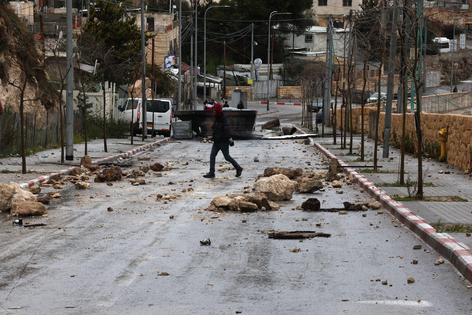What international law says about Israel's planned destruction of Palestinian assailants' homes
Published in Political News
After a deadly attack that killed seven people outside an East Jerusalem synagogue, the Israeli government responded by sealing off the home of the Palestinian suspect in preparation for its destruction. The family home of a 13-year-old accused in a separate East Jerusalem shooting has likewise been earmarked for destruction.
This is not unusual. Israel has demolished the homes of thousands of Palestinians in recent years. Bulldozing properties of those deemed responsible for violent acts against Israeli citizens or to deter such acts has long been government policy.
But it is also illegal under international law. As an expert on international humanitarian law, I know that holding the family of assailants responsible for their acts – no matter how heinous the crime – falls under what is know as collective punishment. And for the past 70-plus years, international law has been unequivocal: Collective punishment is strictly prohibited in nearly all circumstances. Yet, when it comes to the demolition of Palestinian homes, international bodies have been unable to enforce the ban.
Rules governing how occupying powers can treat civilians are covered by the Fourth Geneva Convention – one of four treaties adopted after the end of World War II, largely as a response to the horrific excesses of Japanese and German occupying armies.
Article 33 of the 1949 convention states: “No protected person may be punished for an offense he or she has not personally committed. Collective penalties and likewise all measures of intimidation or of terrorism are prohibited.” It adds: “Reprisals against protected persons and their property are prohibited.”
Since Israel is an occupying power in the eyes of the the United Nations, as well as under the terms of both the Fourth Geneva Convention and the earlier 1907 Hague Convention, then Palestinian civilians under Israeli occupation would fall under the “protected persons” designation of the Geneva Conventions.
The Geneva Conventions reiterate their position on protected persons further in Article 53: “Any destruction by the occupying power of real or personal property belonging individually or collectively to private persons […] is prohibited, except where such destruction is rendered absolutely necessary by military operations.”
That slight caveat would apply to instances in which, for example, an armed resistance group used a home belonging to a protected person to fire at an occupying power’s army. But clearly that is not the case in the deliberate destruction of a home belonging to an assailant who launched an attack elsewhere.
Collective punishment is banned not only by the instruments of international humanitarian law, but also by human rights conventions that apply during peacetime and armed conflicts, including occupation.
And such prohibitions are not a quirk of international law – they are common to almost all major legal systems in the world.
Given how clear the international laws are, the question arises: How does Israel square the practice of punitive home destruction with international law?
The answer is not very well, in the opinion of most international humanitarian law experts and human rights observers.
Israel ratified the Geneva Conventions in 1951. But successive Israeli governments have claimed that its protections do not apply to those living in Palestinian territories, the status of which it disputes.
Other arguments put forward by the Israeli government in defense of the demolitions include that they affect only the properties of individuals engaged in terrorism, and that the aim is deterrence, not punishment.
But as early as 1968, Theodor Meron, a legal adviser to the Israeli Ministry of Foreign Affairs, warned that in his opinion the destruction of homes of terror suspects in the occupied territories contravened the Geneva Conventions. In a top-secret document, Meron rejected a “narrow, literal” interpretation of international law in regards the destruction of homes.
The United Nations has long condemned the destruction of Palestinian homes, with the body’s special rapporteur Michael Lynk repeatedly pointing out that collective punishment violates international law.
Israeli Prime Minister Benjamin Netanyahu has dismissed such condemnation by the United Nations, claiming that the body shows “anti-Israeli” bias.
Either way, the United Nations is not in a strong position to take action. The U.N.‘s Security Council is the one international body that can take effective measures to censure and take coercive action against member states. But the U.S. has long vetoed resolutions critical of its ally, Israel. Washington is also unlikely to assert unilateral pressure on Israel to end its practice of home demolitions under its current policy. The International Criminal Court ruled in 2021 that it had jurisdiction over territories occupied by Israel, but any investigation would be likely hampered by the noncooperation of the Israeli government, which refuses to acknowledge the court’s authority.
As a result, despite the destruction of the homes being against the letter and spirit of the Geneva Conventions, there is little that can stop the Israeli government from doing so.
This article is republished from The Conversation, an independent nonprofit news site dedicated to sharing ideas from academic experts. If you found it interesting, you could subscribe to our weekly newsletter.
Read more:
Israel’s Netanyahu facing off against the supreme court and proposing to limit judicial independence – and 3 other threats to Israeli democracy
A stunning political comeback for Israel’s Netanyahu may give way to governing nightmare ahead
Robert Goldman is affiliated with the International Commission of Jurists























































Comments